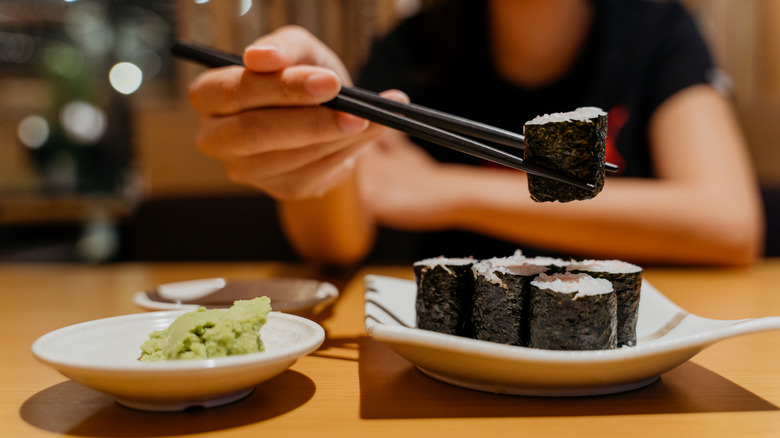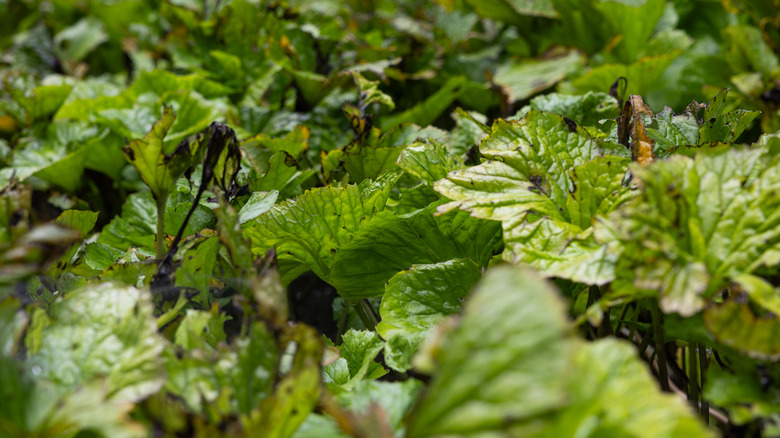The Fiery Hot Ingredient That Can Boost Your Memory Power
Most people who love sushi probably also seek out the hot and pungent flavor of the complementary ingredient, wasabi. You pick up your roll of sushi, dip one end in the spicy green stuff and the other in soy sauce, and put the food in your mouth. Yum.
Wasabi comes from the underground stem (rhizome) of the Japanese plant called Eutrema japonicum, per Vice. While we might enjoy the fiery hot dish while out at a Japanese restaurant, researchers from Tohoku University have found that this green ingredient can improve your memory as well — both short-term and long-term memory, to be exact (via CBS News).
The team, led by Rui Nouchi, an associate professor at the school's Institute of Development, Aging, and Cancer, zeroed in on the main active component in this Japanese plant, which belongs to the cruciferous family – a biochemical named 6-MSITC – which has both antioxidant and anti-inflammatory properties. What did the research entail exactly?
The study looked at the effects of wasabi extract on an elderly population
72 elderly, yet healthy, participants between the ages of 60 and 80 took part in the 2023 study published in the journal Nutrients. They were split into two groups, where one half consumed 100 milligrams of wasabi extract before going to sleep at night for three months, while the other took a placebo for the same length of time (via CBS News).
When the subjects were tested for working memory (a type of short-term memory concerned with holding memory temporarily) and episodic memory (a type of long-term memory related to conscious recollection) via standardized tests after 12 weeks, those who'd taken the fiery hot ingredient before sleep saw a significant improvement in both types of memory. In fact, scores related to episodic memory had risen by 18%. When compared with the placebo group, the bedtime wasabi-drinkers scored 14% higher overall.
However, researchers didn't see marked improvement in the cognitive domains that have to do with executive function, processing speed, and attention. The idea is that the 6-MSITC found in wasabi could be influencing inflammation and oxidant levels in an area of the brain associated with learning and memory – the hippocampus. Rui Nouchi focused on this study as a means to uncover a daily supplement for memory loss that might offer a more sustainable approach to seniors wanting to improve memory power. But there's a catch: wasabi isn't as widely available as you might think.
The fiery hot wasabi you have at your favorite Japanese restaurant might not be authentic
Authentic wasabi is considered one of the most challenging plants to grow commercially, per CNN. It requires a temperature of about 50 to 64.4 degrees Fahrenheit and takes two years to grow, for starters (via Vice). Oh, and it isn't a fan of direct sunlight and costs as much as $300 a kilo (via Pyschiatrist.com).
Chef Aya Yamamoto of Gastronomia Yamamoto in Milan told Vice that what you'd typically find in the U.S. or any other Western country might not be the actual wasabi to begin with. Restaurants are probably using the underground stem of horseradish instead, adding food coloring and Chinese mustard to mimic the authentic plant's hue and taste. So if you thought you could run to your favorite Japanese fine dining outlet or grocery store and pick up plain wasabi containers in the hopes of boosting your memory power, you'll be disappointed.
What does this mean for dementia research, though? Rui Nouchi is hopeful, but he does think more studies need to be conducted on different age groups for more conclusive data. "We knew from earlier animal studies that wasabi conferred health benefits. But what really surprised us was the dramatic change. The improvement was really substantial," he added (via CBS News).


